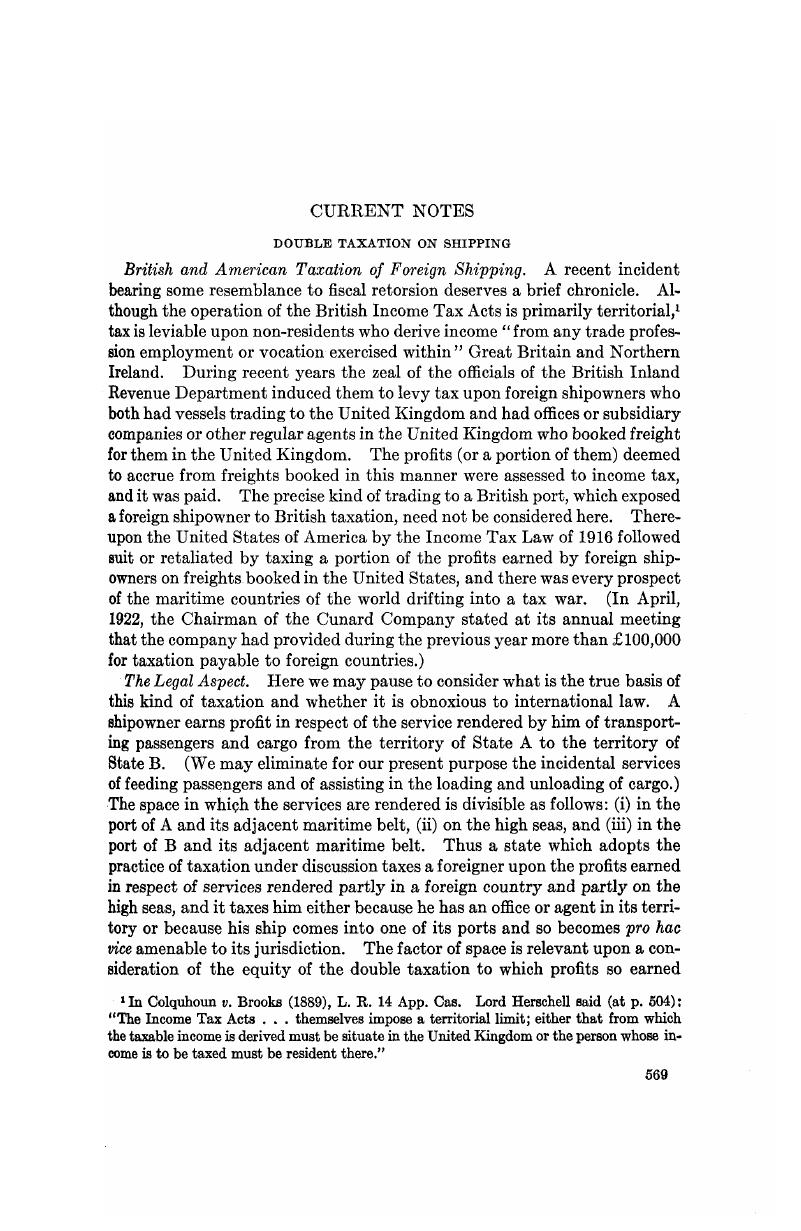No CrossRef data available.
Article contents
Double Taxation on Shipping
Published online by Cambridge University Press: 04 May 2017
Abstract

- Type
- Current Notes
- Information
- Copyright
- Copyright © by the American Society of International Law 1925
References
1 In Colquhoun v. Brooks (1889), L. R. 14 App. Cas. Lord Herschell said (at p. 504): “The Income Tax Acts . . . themselves impose a territorial limit; either that from which the taxable income is derived must be situate in the United Kingdom or the person whose income is to be taxed must be resident there.”
2 Moore's Digest of International Law, II, p. 59, cited by Borchard, Diplomatic Protection of Citizens Abroad, p. 95.Google Scholar
3 International Law, Vol. I, p. 365.Google Scholar
4 On Double Taxation generally, see Dr. Wittmann, International Law Association's Transactions for 1908, and Professor Suyling, ibid., for 1921: also two League of Nations Publications—Report on Double Taxation by Professors Bruins, Einaudi, and Seligman and Sir Josiah Stamp (1923), and Memorandum on Double Taxation by Sir Basil Blackett (1921)
5 XXXII, 587, 615.Google ScholarSee also Harvard Law Review, XX, 138. Both cited by Hyde, op. cit.Google Scholar
6 Pullman's Palace-Car Co. v. Pennsylvania, 141 U. S., 18 (1888).Google Scholar
7 The case would not fall within Hall's definition of retorsion, International Law, 8th ed., by Higgins, A. Pearce, p. 433:Google Scholar “Retorsion is the appropriate answer to acts which it is within the strict right of a State to do, as being general acts of State organisation, but which are evidence of unfriendliness, or which place the subjects of a foreign State under special disabilities as compared with other strangers, and result in injury to them. It consists in treating the subjects of the State giving provocation in an identical or closely analogous manner with that in which the subjects of the State using retorsion are treated.”
8 The following extract from the draft Report of the Chamber of Shipping of the United 'Kingdom for 1925 shows the present state of the matter (January, 1925):
“The Chamber have urged the Government to make a chain of such agreements for reciprocal exemption with all maritime countries. Accordingly exemption has been arranged with Norway, Sweden and Denmark and is understood to be in course of negotiation with Germany and Holland. Steps have been taken to facilitate an arrangement between France And the U. S. A. which may precede agreement between France and Great Britain. Arrangements have already been made between the U. S. A. and Holland, Norway, Sweden and Denmark, and are in negotiation with Germany. Japan has amended its law to enable it to take advantage of reciprocal exemptions, and Italy is likely to follow suit."—A. D. MCNAIB.




